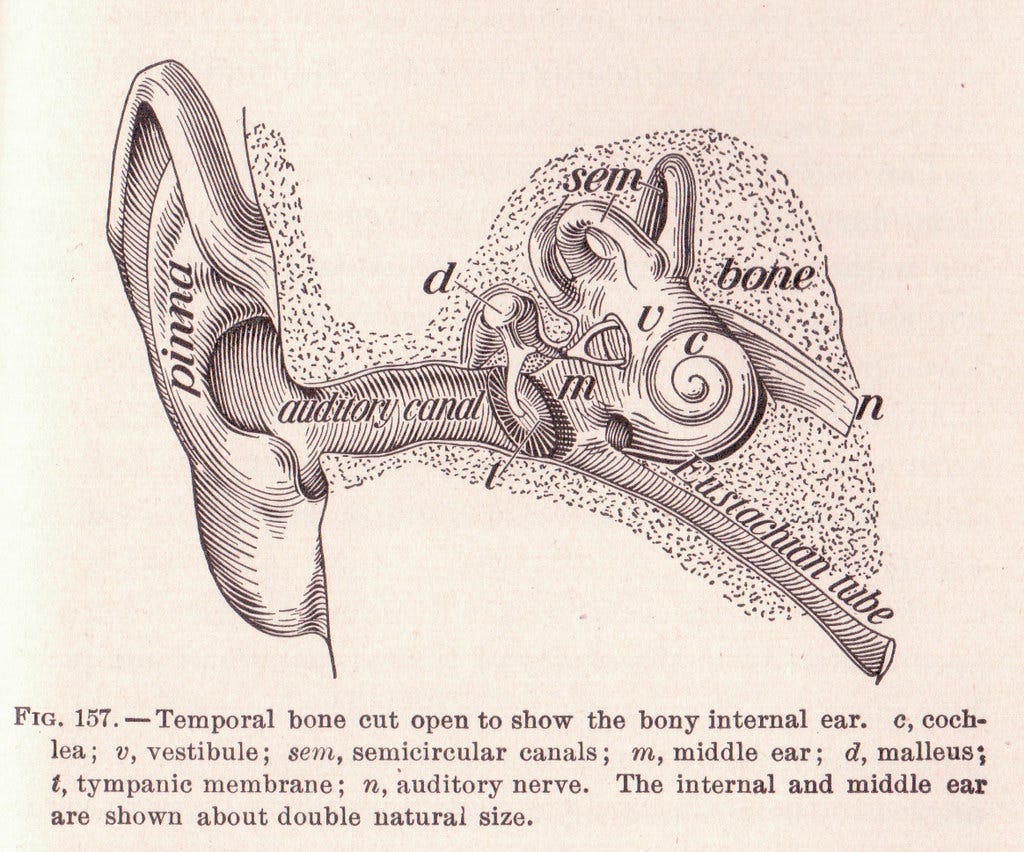Tinnitus
I used to hated my ears. They are massive and slightly pointy, not unlike an elf’s ears.
Once at secondary school the boy I fancied asked me out as a joke. It was a very cruel joke! When I quickly said yes, (“yes!!!”) he replied ‘sorry I forgot I’m gay’. That bit was quite funny. Later, he said he did not like me because I had big ears. To be clear, he added he would rather “get off with a toilet seat”. A bit much but okay.
I used to imagine slicing them off with a surgical knife. How the skin would pull apart from the cartilage and I could slip them out like a hand from a glove. But since then I have made a kind of peace with them, even becoming a little fond of them in their ludicrous enormity.
Someone once told me that ears do not count, and I guess they had a point. No longer caring about my ears made me feel hopeful, stupidly. You can move on from the crass vanities which preoccupy you. And so it was quite annoying to develop an ugly lifelong hum in them, giving me a reason to really hate them, a few years later.
I developed tinnitus the same night I found out I had gotten my first book deal. I went to sleep thinking, my life could really change. I woke up with a ringing in my ears that has not yet gone away.
The first month of tinnitus was hell. My days became characterised by suicide ideation and nerves; life felt long and hard. It seems absurd to be so troubled by what is essentially an annoying sound; but its inescapability and totality is maddening.
Now I am well used to the sound, which is midway between the hiss of television static and the roar of the ocean. I rarely think about it, though recently I have been dipping in and out of Michael Faber’s new book Listen: On Music, Sound and Us, in which he announces also having the condition with “Whee! I have tinnitus.” I appreciate that introduction. It has an “I’m insane lol’ sensibility I can relate to.
He only mentions it a few times, saying he struggles to forget it, and is trying to train himself to ignore it. This feels quite alien for me, as I now rarely notice it. But it was one of the first things I thought about when I came up with the idea of writing a series of columns about abjection.
My initial feelings on developing tinnitus I think now, were of being abjected. It was akin to finding a spider or something unpleasant on my hand, then violently shaking it off: except the unpleasant thing was in my head, and I couldn’t do anything about it.
So little is known about what causes tinnitus and how it can be treated ,there is a desperate grapple for cause and effect; to make sense of this maddening, untreatable thing. Some think it is god: a platonic understanding of a formless entity unrelated to our senses and heard only by a few. I thought it was punishment but then I was raised Catholic. But there is something about it that is fundamentally impossible to parse. It is something from nothing, and it never goes away.
“You can sit by my side if you like, with your ear against my head,” Faber writes. “...But you won’t be able to detect the metallic squeak.”
My grandma, who also hates her ears, who I no doubt inherited my generously proportioned ears from (and my loathing of them), who told me I should wear a headband on them at night to flatten them against my head, because that is what she did for twenty years and now they look fine, recently developed a form of tinnitus herself, called musical hallucinations. She hears music, everything from showtunes to waltzes (the waltzes are her favourite). Her theory is that she is picking up signals from a nearby radio. Sometimes she says, “they’re playing a good one now, a Polish one”, and she tilts her head to the side, looking happy.


